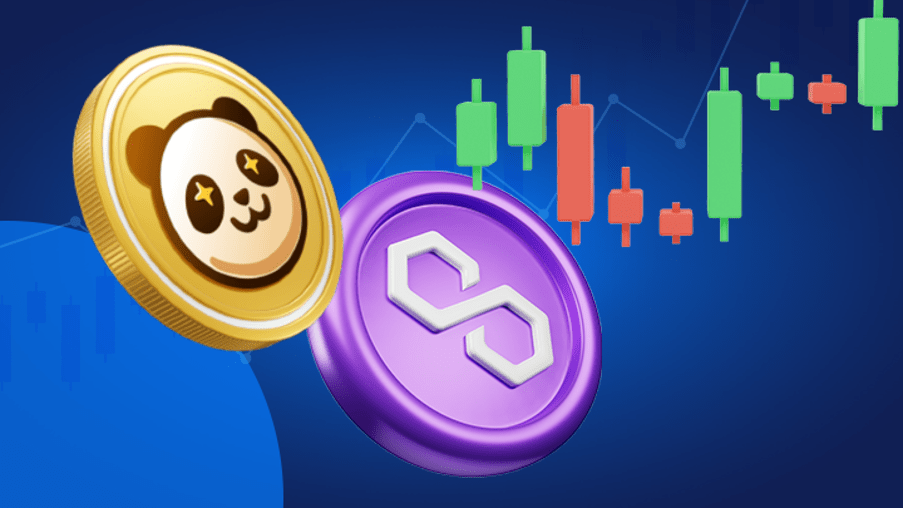Step into the ever-evolving landscape of decentralized finance, where we spotlight two significant entities: Polygon (MATIC) and Pandoshi (PAMBO). Polygon has long been a vital force in the DeFi sector, but now, Pandoshi is ascending as a formidable competitor. With its distinctive characteristics and an impressive presale journey, experts suggest that Pandoshi might soon rival the position of Polygon.
So, let’s embark on an exploratory journey to dissect and comprehend the capabilities and future prospects of these tokens. This exploration isn’t about favoring one over the other but rather grasping the directional winds of the current market trends.
Pandoshi (PAMBO): The New DeFi Leader
Pandoshi has rapidly made a name for itself within the crypto sphere, securing over $1.7 million in a mere two weeks, showcasing the market’s confidence in its vision. This project embodies the essence of blockchain technology – championing decentralization, privacy, and economic empowerment. It serves as a quintessential decentralized initiative led by its community, with users influencing its path forward.
The ecosystem of Pandoshi is comprehensive, built upon various decentralized features. It includes a Layer-2 network operating on a Proof of Stake protocol, a decentralized exchange (DEX), a secure wallet that users manage, interactive Metaverse gaming, and educational platforms like Pandoshi University. These, along with cryptocurrency-compatible prepaid cards, aim to provide a seamless and efficient management of crypto assets globally, all without the necessity for Know Your Customer (KYC) procedures.
Pandoshi’s presale is organized into five distinct stages, currently in its third phase with tokens offered at $0.006. As it advances to the fourth phase, the price is expected to rise to $0.008 and finally peak at $0.01 in the final phase, marking a significant milestone for the initiative.
PAMBO, the primary utility token within the Pandoshi ecosystem, is integral across various platforms including PandaChain (Layer 2 Network), the Metaverse Game, and Pandoshi University. It also benefits from the buy-and-burn method employed by PandoshiSwap (DEX) and Cardoshi (prepaid cards). PAMBO is a deflationary token, with a buy-and-burn policy that continues until 80% of its total supply is removed from circulation. It can be acquired through direct purchase or by engaging in Pandoshi’s official activities.
Furthermore, Pandoshi introduces BAMBOO as its governance token, granting community members a voice in the project’s future direction. BAMBOO, an inflationary token without a fixed cap, can be earned through the collateral staking of PAMBO tokens.
When users stake PAMBO, they receive Shares proportional to the total PAMBO staked, ensuring a decentralized and equitable distribution of influence. The rewards per Share are fixed, and all BAMBOO tokens used in governance are permanently removed from circulation, emphasizing its governance-exclusive role.
While BAMBOO’s primary purpose is governance, holders are free to trade their tokens as desired, adding an extra layer of utility and flexibility to the Pandoshi ecosystem.
Click Here To Take Part In Pandoshi Presale
Post-presale, PAMBO is set to make its debut on prominent decentralized exchanges such as Uniswap, followed by appearances on centralized exchanges including Binance and Coinbase. The anticipated listing of PAMBO on these trading platforms is likely to trigger an upward price trend, attracting fresh investors keen to buy the token at the predefined public rate.
Polygon (MATIC)
Polygon serves as a layer-2 enhancement for Ethereum, significantly amplifying the network’s speed and scalability. This platform enables the development of Ethereum-compatible applications, circumventing the issues of hefty fees and sluggish transaction times commonly associated with Ethereum. The network’s security is maintained through a proof of stake consensus mechanism, contributing to Polygon’s reliability and efficiency. The network has witnessed widespread adoption, with prominent decentralized applications such as Aave, SushiSwap, and Decentraland utilizing its infrastructure. This adoption underscores Polygon’s successful mitigation of some of Ethereum’s core challenges.
Nevertheless, when it comes to linking the worlds of cryptocurrency and traditional finance, Polygon lacks direct solutions. Users aiming to convert their MATIC into tokens for real-world transactions often rely on platforms like Pandoshi, which facilitate the conversion of MATIC to currencies like Ethereum for practical use.
Click Here To Take Part In Pandoshi Presale
Visit the links below for more information about Pandoshi (PAMBO):
Website: https://pandoshi.com/
Whitepaper: https://docs.pandoshi.com/
Disclaimer: This is a paid release. The statements, views and opinions expressed in this column are solely those of the content provider and do not necessarily represent those of Bitcoinist. Bitcoinist does not guarantee the accuracy or timeliness of information available in such content. Do your research and invest at your own risk.
